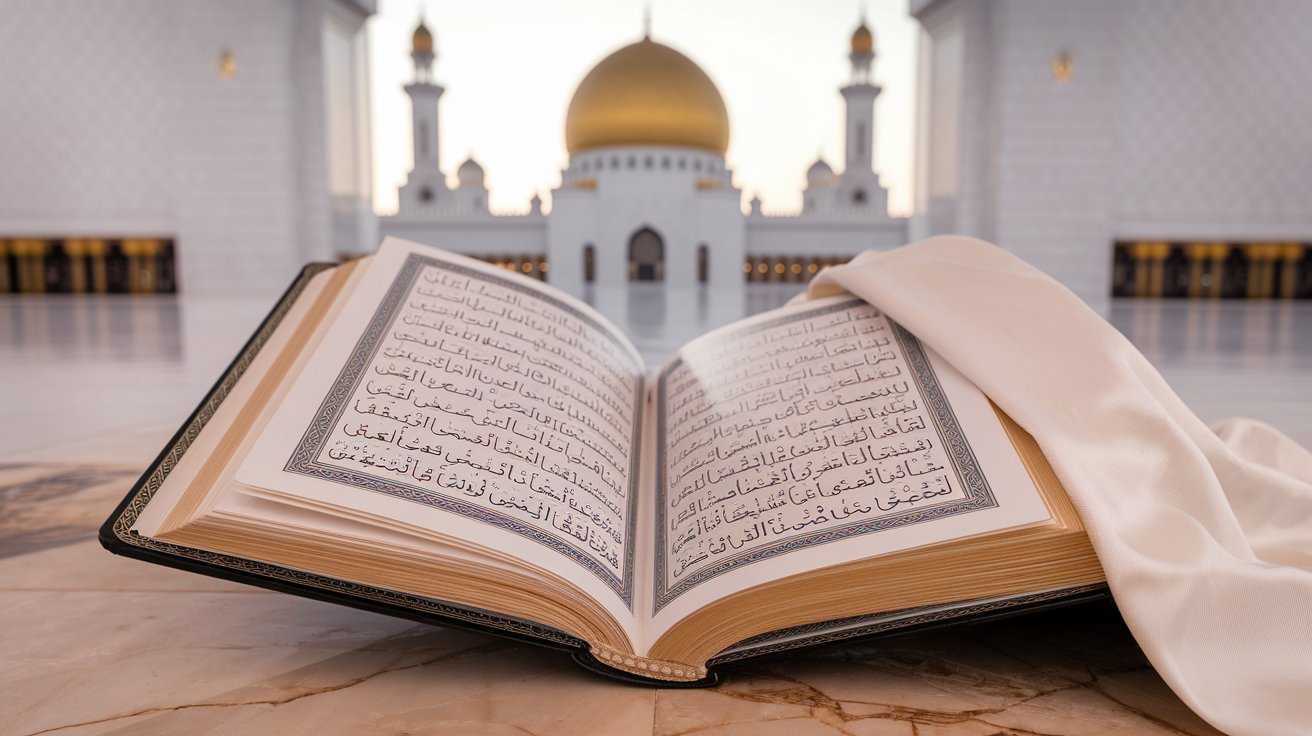The Quran, Islam’s holy scripture, holds immense spiritual, cultural, and historical significance. It is not merely a book; it is a profound guide for Muslims worldwide. From understanding the meaning of the Quran to exploring its origins and purpose, this article delves deeply into the essence of the Quran and its impact on human life.
What is Quran in Simple Words?
The Quran (also spelled Qur’an) is the holy book of Islam, believed by Muslims to be the word of God (Allah) as revealed to the Prophet Muhammad through the angel Gabriel. It serves as a spiritual, moral, and practical guide for living a righteous life and achieving closeness to God.

Qur’an Meaning: What Does the Word Quran Mean?
The word Quran originates from the Arabic root “qara’a,” which means “to read” or “to recite.” Hence, the Quran is often translated as “the Recitation.” It emphasizes oral transmission, reflecting how it was revealed and initially propagated.
The Meaning of the Qur’an: Understanding Its Purpose
The Quran is considered by Muslims as a universal message of guidance, offering wisdom on all aspects of life. It provides:
- Spiritual Guidance: Teaching devotion, prayer, and trust in Allah.
- Moral Principles: Highlighting justice, compassion, and ethical behavior.
- Legal Frameworks: Addressing social, economic, and family matters.
Quran Meaning in English: A Universal Message
In English, the term Quran signifies a compilation of divine revelations. It has been translated into many languages to make its message accessible worldwide, although the original Arabic remains its sacred form.
What Did Quran Mean Historically?
Historically, the Quran revolutionized Arabian society, transforming a tribal culture into a unified community. It introduced principles of monotheism, accountability, and the importance of knowledge.
What is the Concept of the Quran?
The Quran is regarded as the literal word of Allah, addressing humanity’s relationship with God, the purpose of existence, and the path to eternal salvation. Its concept revolves around these core ideas:
- Tawhid (Oneness of God): Affirming that God is unique and without partners.
- Guidance for All: A universal scripture for every nation and culture.
- Accountability: Stressing the Day of Judgment and individual responsibility.

What is the Quran Mainly About?
The Quran comprises 114 chapters, or Surahs, which cover a wide array of topics:
- Faith: Emphasizing belief in one God and the hereafter.
- Worship: Providing guidance on prayers, fasting, and other acts of devotion.
- Ethics: Advocating for honesty, charity, and justice.
- Prophets: Narrating stories of previous messengers like Moses, Jesus, and Noah.
- Society: Discussing laws on marriage, inheritance, and commerce.
What is Quran in Islam?
In Islam, the Quran is the ultimate source of religious authority. It is recited during prayers and ceremonies, studied for personal development, and consulted for decision-making. The Quran’s centrality reflects its divine origin and unmatched importance in a Muslim’s life.
Importance of the Quran
The Quran’s importance cannot be overstated. It serves as:
- A Guide to Faith: Strengthening belief in Allah.
- A Source of Law: Establishing principles for justice and equity.
- A Moral Compass: Teaching virtues like patience, humility, and kindness.
- A Spiritual Bond: Connecting believers to their Creator through recitation and reflection.
When Was the Quran Written, and Who Wrote It?
The Quran was revealed to Prophet Muhammad over 23 years, beginning in 610 CE in Mecca and continuing until his death in 632 CE in Medina. While Muhammad was illiterate, his companions memorized and wrote down the revelations on various materials like parchment and palm leaves.
After the Prophet’s death, Caliph Abu Bakr commissioned the first compilation of the Quran into a single manuscript to preserve it. Later, Caliph Uthman standardized the text, ensuring uniformity across the Islamic world.
Who Wrote the First Quran?
The first written Quran was compiled under the supervision of Prophet Muhammad’s closest companions, including Zayd ibn Thabit, his primary scribe. Their dedication ensured the accurate preservation of every word.
How Old is the Quran?
The Quran is over 1,400 years old, dating back to the 7th century CE. Despite its age, its message remains timeless, resonating with millions of believers today.

Quran Reading: A Spiritual Experience
Reading the Quran is an act of worship in Islam. It is often recited in Arabic, as the language of revelation is considered integral to its message. Many Muslims also study translations and interpretations (Tafsir) to grasp its deeper meanings.
The Quran’s rhythmic style and poetic beauty make its recitation an unparalleled spiritual experience. It is memorized entirely by millions of Muslims, known as Hafiz, a testament to its enduring legacy.
Who Wrote the Quran? Divine Origin and Compilation
Muslims believe that the Quran was not “written” by any human; it is the word of Allah, revealed through the angel Gabriel. Its compilation, however, involved meticulous efforts by Muhammad’s followers to ensure no errors or alterations occurred.
Why is the Quran So Important Today?
The Quran’s teachings continue to inspire and guide individuals in their personal, social, and spiritual lives. Its messages of hope, unity, and peace are universally relevant. Whether addressing ethical dilemmas or offering solace in times of distress, the Quran remains a timeless beacon of light.
FAQs
What is Quran in simple words?
The Quran is Islam’s holy book, containing God’s guidance for humanity as revealed to Prophet Muhammad.
What does the Quran mean?
The term Quran means “the Recitation,” highlighting its oral transmission and central role in Islamic worship.
What is the concept of the Quran?
The Quran conveys the oneness of God, guidance for living a moral life, and accountability in the hereafter.
Who wrote the Quran?
The Quran was revealed to Prophet Muhammad by Allah and recorded by his companions. It is considered divine and unaltered.
When was the Quran written?
The Quran was revealed over 23 years, from 610 to 632 CE. Its compilation into a single book occurred shortly after Muhammad’s death.
Why is the Quran significant in Islam?
The Quran is the ultimate guide for faith, law, and ethics in Islam, shaping the lives of Muslims spiritually and socially.
Conclusion
The Quran, with its profound messages and divine origin, is central to Islamic faith and culture. Its themes transcend time and geography, offering wisdom and guidance to anyone seeking a meaningful life. Understanding the Quran’s meaning, purpose, and history reveals not just the essence of Islam but also a universal call to righteousness and peace.










